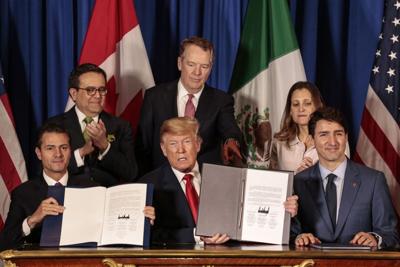When U.S. President Donald Trump increased tariffs on Canadian goods to 35 per cent from 25 per cent on Aug. 1, many were quick to point out that most of our exports are exempt under the Canada-United States-Mexico Agreement (CUSMA/USMCA).
Prime Minister Mark Carney said that 85 per cent of the Canada-U.S. trade is tariff-free, while found that more than 90 per cent of our exports are exempt under CUSMA.
While in theory most Canadian exports qualify for exemptions, in practice thousands of small exporters donŌĆÖt. According to the Canadian Federation of Independent BusinessŌĆÖs latest data, fewer than half (44 per cent) of small exporters are compliant with CUSMA rules. That number drops to 30 per cent among small retailers.
While protecting CUSMA has to be CanadaŌĆÖs top trade priority, complying with the agreement is not a straightforward process.
Exporters have to navigate through a jungle of customs codes, assess the content of their products to determine rules of origin, obtain production and supplier documentation and origin statements, and verify packaging and labelling compliance.
One mistake can mean a lengthy and costly audit, or even fines, and all of that needs to be done for each product the exporter ships across the border. Records need to be kept on file for six years in case thereŌĆÖs an audit.
A recent dismal GDP report, falling exports and a hard-hit Canadian manufacturing sector, writes
ItŌĆÖs a compliance headache for the largest businesses with dedicated teams, let alone small firms. A small manufacturing company in Alberta told us that key details are buried within complex regulatory language or across various sources, making it hard to follow information in a straightforward way.
The business is also concerned about compliance paperwork, custom delays and additional or hidden fees. On the East Coast, a dental practice in New Brunswick reported a lack of clear and accessible information around compliance requirements, rising fees and confusing customs regulations.┬Ā┬Ā
Before the trade war, many businesses preferred to eat the 2.5 per cent Most Favoured Nation tariff rather than spend the time and money it would take to become CUSMA-compliant. These are the businesses now forced to deal with a mountain of paperwork, and likely hire an expensive consultant, or face the consequences of a 35 per cent tariff on their American customers.
Add on the U.S. decision to scrap its $800 de minimis ŌĆö the duty-free allowance often used for direct-to-consumer sales ŌĆö and you can see why small business confidence has struggled since the onset of the trade war, and nearly four in 10 small businesses facing tariff costs worry about having to make some tough decisions such as laying off staff, changing their business model or closing their business if nothing changes.
Many small businesses are also having to navigate sectoral tariffs outside of CUSMA: a 10 per cent tariff on non-CUSMA-compliant potash and energy products; a 50 per cent tariff on aluminum and steel imports; a 25 per cent tariff on all cars and trucks not built in the U.S.; a 50 per cent tariff on copper; and a 35.19 per cent duty on softwood lumber.
The sectoral tariffs are having consequences.
As one wholesale business in Manitoba put it after having to decline customer requests for items theyŌĆÖd been carrying for years: ŌĆ£Now, we canŌĆÖt justify continuing to purchase them with the tariffs, so we are losing sales that we rely on as a very small business. The tariffs, coupled with historically high inflation, have drastically changed the landscape for my industry. Not sure whether it will ever recover.ŌĆØ
Unfortunately, itŌĆÖs an all too familiar worry these days.
We need the federal government to take action. It needs to continue to work to end the trade war for good; but in the meantime, there need to be concrete relief measures in place that recognize that tariffs are hitting small firms hard.
CFIB is recommending the government take the money that it has collected in Canadian counter-tariffs and rebate it back to affected businesses, similar to the carbon tax rebate or provincial workersŌĆÖ compensation rebates.
Prime Minister Mark Carney and Mexican President Claudia Sheinbaum will have a lot to talk about
Alternatively, they could use the collected money to temporarily reduce the small business tax rate, allowing small businesses to keep more of their earnings and reinvest them back into their employees and operations.
There are lots of ways to help. Shop at your local small businesses; they need your support more than ever. Every time you shop local, 66 cents of every dollar goes back into the local economy, ultimately benefiting everyone in the community. The only thing we cannot afford is to do nothing.
Behind every data point and statistic there is a family-run store: a manufacturer, a retailer, an employee, a neighbour. If we donŌĆÖt help, it wonŌĆÖt just be exports weŌĆÖre losing. It’ll be businesses.
































To join the conversation set a first and last name in your user profile.
Sign in or register for free to join the Conversation